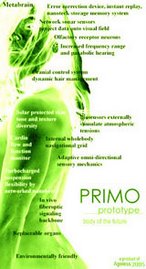Human enhancement is any attempt, natural or artificial, at overcoming human body limitations. However, the term is often applied to the use of "technological means to select or alter human aptitudes and other phenotypical characteristics, whether or not the alteration results in characteristics that lie beyond the existing human range".
Human enhancement entails the application of specific technologies- i.e. neuro-, cyber-, gene-, and nano-technologies — onto human biology. The uses of these technologies ranges from medical purposes (or therapeutic- such as the common use of laser eye surgery to rid one of cataract), to more cosmetic purposes (non-therapeutic- such as breast implantation).
The use of human enhancement technolgies on healthy bodies has raised some significant ethical, legal, and social concerns. Bioethicists are concerned with the ethical consequences of the relationships among life sciences, biotechnology, medicine, politics, law, philosophy, and theology. Bioethicists such as Arthur L. Caplan argue that the use of biotechnologies on healthy humans is merely an indication of vanity, and that this will result in a greater divide between the "haves" and the "have-nots".
However, transhumanists including Ray Kurzweil and Nick Bostrom argue for human enhancement. They view the science as a means to unify humans and technology in the progression towards human evolution. They argue that evolution should be in our hands.
The purpose of this blog is not to take either side of the argument. It is merely to offer insight into human enhancement and provide a forum for the debate to continue.
Which side of the debate do you fall under?
Subscribe to:
Post Comments (Atom)

No comments:
Post a Comment